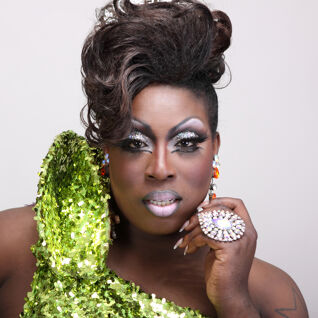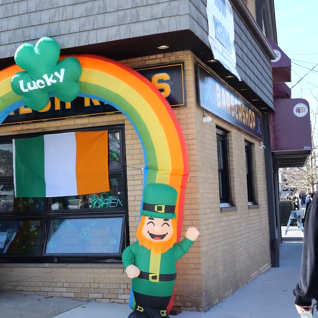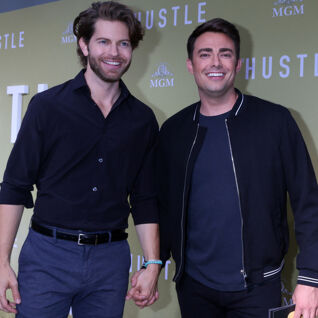
The Cher Show on Broadway is the kind of unabashed crowd-pleaser to which you can take both your visiting parents and your gaggle of gay pals. Whether you grew up listening to “I Got You, Babe” on the radio and watching The Sonny & Cher Comedy Hour or came out to “Believe” after seeing her as Jack’s vision of God on Will & Grace, it’s impossible not to throw yourself wholeheartedly into a show this over-the-top. (Unless you’re Kanye, I guess.)
The biographical jukebox musical, written by Jersey Boys writer Rick Elice and directed by Jason Moore (Pitch Perfect), features three different actresses, including Tony nominee Stephanie J. Block, playing the singer at different stages of her career, her life story told through her decades-spanning catalog of hits.
After The Cher Show’s glittering Broadway premiere earlier this month, we chatted with Elice and Moore about bringing the ultimate diva’s story to the stage, making a jukebox musical that works, and the controversial way they chose to handle Chaz Bono’s presence in the show.
Can you recall your first exposure to Cher? What were your first impressions of her?
Jason Moore: I was really into variety shows as a kid. I watched Carol Burnette and Donnie and Marie, and I realize now that was my first access to the musical theater. I knew Cher from the shows and from the albums. My mom had all the LPs, so we listened to “I Got You, Babe” a lot around the house.
Rick Elice: It’s a little like trying to say, What’s your first exposure to your mom? This woman has always been there. The first time I got to know her well, I was working on the advertising for Silkwood. I watched that film and I saw her as the actor in that film. But it was sort of impossible not to know Cher because she wasn’t just on television, she was ubiquitous. She was like air.

How did end up making a musical about her life?
Elice: At the end of 2014 I got a call from [producer] Flody Suarez, who asked to meet me about a project. I met him for lunch and he said, “It’s a biography of Cher.” I said, “I don’t really think that it’s something that I should do.”
Why not?
Elice: A reasonable question! I just thought I was the wrong gay man to do it. I’ve always associated Cher—maybe wrongly—with a certain sort of campiness. And that’s just not my skill set. And Flody, being a good producer, said, “Well if you were to do it, what do you think you would do?” I said I would do it with more than one actor playing Cher.

Why? Why cast three different actresses to play Cher at various points in her life?
Elice: She’s so well known that any one person doing it would be saddled with judgment based on her ability to impersonate. And that sort of impersonation kind of show wasn’t interesting to me. There are people who do it, male and female, all genders I suppose, who do it brilliantly. But it’s not something that I wanted to invest a lot of time in. So, I would do it with one person to spare that person that kind of hard comparison. Also, it would be a show where anybody playing Cher would have to do a heavy load of singing, and that’s hard to do eight times a week.
The other thing is, I wasn’t interested in doing another show leaning heavily on a narrative voice. So, if there were more than one, you could treat Cher like a girl group. They can not only sing songs that we’ve only heard as solos as duets and trios, but we can also have drama because when you’re talking to yourselves you can argue with yourself, you can cheer yourself on, and that felt like scenes that would be fun to write.
It sounds like all the elements were there. What convinced you to sign on?
Elice: The phone rang and it was Cher. Of course, for a while, I suspected it was my friend Christian Borle. But it was indeed Cher. My husband of 35 years had just been diagnosed with terminal brain cancer. Things had become very grave at home, but I was urged by my dying husband to go and talk to her so I could come back and tell him what Cher was like. Then three months after my husband passed away, the phone rang and it was Cher again. She said, “You should come out here to California and we should get to know each other. It’s time for you to rejoin the human race.” She was very attentive and she talked about experiencing loss in her life, and we bonded over that. She’s not really a theatergoer, so it was hard to talk to her in terms of theater references. But she’s almost professorial about cinema. So I said, “Maybe we can do the Terry Gilliam variety show of your life.” By the time I got home to New York she had tweeted that we were doing it with three Chers.

Jason, did Cher strong-arm you into directing?
Moore: No, I didn’t actually have to be. I already knew her story enough to know it had the potential to make a great show and once I read Rich’s script, I was sold. It was all the things you look for in a great musical: great music, a triumphant story, comedy, and a little bit of flash and pizzaz and a lot of heart.
Jukebox musicals are a very particular kind of thing. Did you have any reservations or preconceived notions about doing one?
Moore: Yes. I’ve seen many jukebox musicals that I liked. Jukebox musicals or catalog musicals—if it’s done well, it’s fantastic, and if it’s not then, well, it’s not. Rick had written one of the best ones [Jersey Boys]. So, even if my first reaction was, That could be tricky—because there are pitfalls, but there are pitfalls to all musicals. Musicals are hard! That’s why there are only one or two huge hits every season, and everyone wants to have one. They’re very difficult puzzles to solve. But since Rick had written one of the most successful ones, I thought, This guy really know what makes them work. And that’s true.
You know, one of the things that are really wonderful about Cher’s catalog is the range. She has emotional ballads, she has dance music, she has disco, she has story songs, she has 60s tunes that have been revamped. So, there was a real variety, just like her career.
I was going to whether the variety of her music posed a challenge, but it sounds like you considered it an advantage.
Moore: There’s so much music, and Rick assigned songs to have emotional weight. We were able to do that because we had so much to choose from. We even took some of the songs and reinterpreted them. We tried to give as much surprise and variety as we could.
Rick, what was your source material? Was there a particular biography you turned to?
Elice: [Laughs] I think she announced this week that she’s going to write the book you’re asking about.
Which will be based on your musical.
Elice: It’ll probably get a mention. I think there are several books, but nothing authoritative. There was a book that she wrote, sort of an anecdotal magic carpet ride through her life. But she was so much a part of our cultural soup. I said to her early on, “Your life is so well documented, what could people possibly learn about you that they don’t already know?” And she said, “When I was breaking up with Sonny, I was on a hotel balcony and I thought, Maybe I should jump.” She started to talk about the lows in her life because what I’d been talking about were the highs. Those are the peaks of her career, and she wanted to talk about the valleys. And the valleys for Cher were interesting to me as a New York-bred left-wing feminist. I was curious how a woman of her generation managed to navigate career and life very closely bounded by what we would call a man’s world. In fact, the song “It’s a Man’s Man’s Man’s World” was in our show for a while.
You can imagine a scenario in which a celebrity like Cher might not want to expose the low points, where vanity is an issue.
Elice: Well, I think that has to be your initial contract with the artist if you’re going to do what Jason and I set out to do. You have to be willing, otherwise, there is no story. It’s a hagiographic celebration of yourself. That’s fine, but that’s kind of what you’re already doing. Cher is still performing and has always done, over the past 20 years, some version of the triumphal goddess warrior who stands atop the mountain and looks into the future. But in terms of drama, you need a really good, intelligent character. And a story is always built on conflict. So, where’s the conflict if we’re just going to be talking about your successes? A revue isn’t what she wanted.
The term du jour is “relatability.” But how do we relate to someone with whom we, in fact, have very, very little in common? Cher’s life is nothing like your life or my life or Jason’s life, or like anyone’s life who sits in the theater and watches the show. And at the end of the show they come out and say, I feel so empowered. So many of Cher’s songs are about strength, finding strength, sources of strength. And in order for that stuff to resonate, to hear songs that you’ve only danced to like a story, you need to put them in a context that includes the warts-and-all approach. So, she said, “Ok, we’ll do that.”
I’ve heard that Cher’s initial reaction to an early version of the show was not great. Can you talk about what her objections were?
Moore: I’ll give what I think is one answer. When it was only a script she was very frustrated with things that didn’t actually happen because that’s the way she sees them. But something magical happened when she finally saw the production in Chicago. She realized it was a show. She’s an incredible entertainer. She knows how to stand on a stage and work an audience. She’s not hiding behind anything. So, once she saw it, she understood that there will be a gap between what actually happens and what works onstage. That was the process we went through: Which things are so important to you because you are still living and some of the people we are portraying are still living? What do we need to get right to make you feel like this is your story? And what can you give us to make the show more exciting? It’s the essence of what happened without necessarily the facts on the timeline that it actually happened. That’s the job. How do you take the truth and interpret it into a show that gives you an entertaining and moving and funny version of the truth?
There was one aspect of the show that I struggled with, and that’s your portrayal of Chaz Bono. The show only refers to him as “Chaz,” and none of the characters use pronouns to describe him. And so, I’m still not sure how to think about that choice. On the one hand, you want to respect who Chaz is, his identity. And on the other, it almost feels a bit like you’ve written a trans narrative out of this story by never acknowledging that Cher’s son is transgender.
Elice: It was a decision that Cher and I made together, and it predates Jason’s involvement with the show. Chaz is his own story, and indeed could be his own show. We’re doing The Cher Show, and in her life, there’s an enormous amount of, for lack of a better term, material. And it’s our job as storytellers to figure out our principles of inclusion and exclusion. There are lots of aspects of Cher’s life that don’t appear in this story. There are lots of aspects that we did have in the show that ended up coming out of the show because when we first previewed in Chicago, the show was three hours long.
I bridle a little bit at the idea that Chaz was written out of the show. I disagree wholeheartedly. Instead, I would suggest, that he is treated with the respect of the utterly normal. He plays a presence in the show which is super important, because as a young mother, Cher needed to figure out how to be a mother and a breadwinner and a wife, and how to figure out how to support [her family]. It seemed to me that the most respect that I could pay to Chaz, given the fact that it’s The Cher Show and the audience wants to hear as many of Cher’s songs as the possibly can, that the way to honor him was to refer to him as “Chaz” and to leave the audience with the impression that there was nothing extraordinarily abnormal about who he is now. Of course, there’s a whole show in what Chaz went through and the relationship that he had with his mother. Or, we could assume normalcy and present it as normal—which felt to me like a really good lesson for the audience. I didn’t know that we were right in treating that subject the way that we did, but I felt that it was right for our show.


















